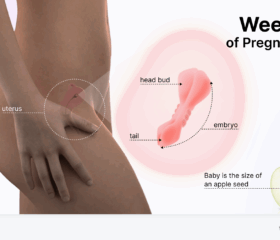Can You Drink Alcohol When Pregnant? Red Wine and Other Drinks
Few things are worth celebrating as much as learning that you’re pregnant. But if you want to raise a glass of champagne to celebrate your pregnancy, think again.

There are plenty of foods and drinks you should avoid during pregnancy, and one of the top concerns for many expecting mothers is alcohol. Is a glass of wine OK from time to time? Can you drink non-alcoholic beer or wine?
Let’s examine the relationship between alcohol and pregnancy, see what the experts say, and go over a few practical tips for navigating social occasions or the urge to drink.
Is any amount of alcohol safe during pregnancy?
No, the overwhelming consensus from health experts is that no amount of alcohol is safe during pregnancy.
The Surgeon General, the American College of Obstetricians and Gynecologists (ACOG), the National Institutes of Health (NIH), the American Academy of Pediatrics (AAP), and the Centers for Disease Control and Prevention (CDC) are all in agreement on this. 1 2 3 4 Drinking when you’re carrying a child just isn’t a good idea.
What about occasionally drinking wine?
You might encounter a few people who say that a few glasses of wine here and there won’t do any harm. Many moms claim they occasionally drank during pregnancy and still delivered healthy babies.
Some women also claim that the alleged health benefits from drinking red wine, like a lower risk of heart disease, outweigh the potential dangers. 5
Despite the purported benefits of wine, the official guidelines on alcohol during pregnancy are crystal clear.
Every pregnancy has what is called a “background risk”—each one begins with a 3% to 5% chance of the baby having a congenital anomaly. 6 It’s irresponsible to add to that risk by drinking, especially since there’s no established safe limit for alcohol consumption during pregnancy.
How does alcohol harm your baby?
When you drink alcohol during pregnancy, it enters your bloodstream and quickly crosses into the placenta and your baby’s developing body.
While your adult liver can process alcohol, your baby’s liver can’t do the same. As a result, alcohol stays in her body much longer. 7
The potential consequences of prenatal alcohol exposure are wide-ranging and can have lifelong implications. These risks are dose-related, meaning the more alcohol you consume, the greater the possible harm. However, even light to moderate alcohol consumption is associated with increased risks.
For example, the American Journal of Obstetrics and Gynecology (AJOG) published a study that states the risk of miscarriage increases by 8% each week you consume alcohol during pregnancy. 8
You’re also more at risk of:
- Preterm labor 9
- Stillbirth (the loss of your little one in the late stages of your pregnancy) 6
- Sudden infant death syndrome (SIDS) 10
- Fetal alcohol spectrum disorders (FASDs) 11
What to know about fetal alcohol spectrum disorders
Fetal alcohol spectrum disorders (FASDs) are a range of conditions that a child is born with if the mom drank during pregnancy, with one of the most severe being fetal alcohol syndrome (FAS).
Children with FAS may exhibit a combination of physical disorders (i.e., growth deficiencies or organ defects), developmental delays, central nervous system problems (i.e., an increased risk of seizures), and cognitive and behavioral issues. 12 13 14
FASDs are preventable. By abstaining from alcohol during pregnancy, you cut down the risk of your child developing these lifelong challenges.
What if you drank alcohol before knowing you were pregnant?
It’s clear that alcohol and pregnancy shouldn’t go together, but what about if you drank in the early weeks of pregnancy, before you even knew you were pregnant at all?
While it’s best to avoid alcohol from the moment you start trying to conceive, try not to panic if you had a few drinks before receiving a positive pregnancy test.
Experts generally agree that limited alcohol exposure very early in pregnancy is unlikely to cause significant harm. Just be sure to cut out alcohol as soon as you find out you’re pregnant and get that all-important prenatal care. 1
How to abstain from wine and other alcohol during pregnancy
Giving up wine might not be the easiest task, especially if it’s a regular part of your routine. Here are a few practical ways to cut out alcohol and manage any cravings you get.
Find healthy ways to relax
If you tend to use alcohol to relax after a stressful day, know that a glass of wine or beer isn’t the only way to wind down. Try to find an alternative way to relax, whether it’s listening to music, having a warm bath or prenatal massage, or even just spending time with loved ones.
Seek support
Reach out to your family, friends, partner, or anyone else in your support network. If you’d find it helpful, ask them to abstain from drinking alcohol in your presence or to distract you with alcohol-free activities when you feel the urge to drink.
If you’re really struggling to quit drinking, don’t hesitate to bring it up with your doctor. They can offer advice, recommend support groups like Alcoholics Anonymous (AA), or refer you to a substance abuse treatment facility.
Try out non-alcoholic beverages
Just because you can’t drink alcohol doesn’t mean you can’t enjoy a night out with family or friends. For example, plenty of bars offer mocktails and alcohol-free options to quench your thirst and satisfy your cravings.
Be careful with non-alcoholic beers and wines
Although non-alcoholic beers and wines might seem like a safe alternative, you should take the “non-alcoholic label” with a grain of salt. 15 Several studies have shown that these beverages can contain small amounts of alcohol, even if the label claims otherwise. 16 17
Final thoughts
Being pregnant means you’ll have to make a lot of lifestyle changes, and avoiding alcohol is one of the most important ones.
No matter how tempting a small sip of your favorite glass of red wine may be, your baby’s health is your top priority. Remember that even though you can’t drink alcohol, that doesn’t mean you can’t still enjoy your pregnancy!
Article Sources
- American College of Obstetricians and Gynecologists. "Alcohol and Pregnancy" Retrieved September 4, 2025.
- Morbidity and Mortality Weekly Report. "Notice to Readers: Surgeon General's Advisory on Alcohol Use in Pregnancy" Retrieved September 4, 2025.
- Public Health Reports. "Alcohol and Pregnancy: CDC's Health Advice and the Legal Rights of Pregnant Women" Retrieved September 4, 2025.
- HealthyChildren.org. "Where We Stand: Alcohol During Pregnancy" Retrieved September 4, 2025.
- MedlinePlus. "Wine and heart health" Retrieved September 4, 2025.
- MotherToBaby. "Alcohol" Retrieved September 4, 2025.
- March of Dimes. "Alcohol and pregnancy don’t mix" Retrieved September 4, 2025.
- Vanderbilt University Medical Center. "Miscarriage risk increases each week alcohol is used in early pregnancy" Retrieved September 4, 2025.
- March of Dimes. "Alcohol during pregnancy" Retrieved September 4, 2025.
- Pediatrics. "Maternal Alcohol Use and Sudden Infant Death Syndrome and Infant Mortality Excluding SIDS" Retrieved September 4, 2025.
- Johns Hopkins Medicine. "Alcohol and Pregnancy" Retrieved September 4, 2025.
- American Academy of Child and Adolescent Psychiatry. "Fetal Alcohol Syndrome (FAS)" Retrieved September 4, 2025.
- Brain Sciences. "Fetal Alcohol Spectrum Disorder (FASD) Associated Neural Defects: Complex Mechanisms and Potential Therapeutic Targets" Retrieved September 4, 2025.
- Texas Department of Family and Protective Services. "A closer look at Fetal Alcohol Syndrome" Retrieved September 4, 2025.
- Canadian Family Physician. "Consuming non-alcoholic beer and other beverages during pregnancy and breastfeeding" Retrieved September 4, 2025.
- Center for Research on Ingredient Safety. "Trending – Non-alcoholic Beer & Hops Flavored Seltzer Water" Retrieved September 4, 2025.
- INTEGRIS Health. "Is Non-Alcoholic Beer Better For You?" Retrieved September 4, 2025.






